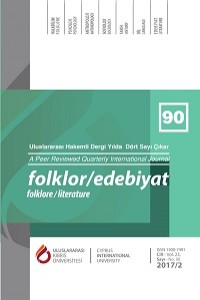Öz
This work is an evaluation, through the criterion of utilitarian ethics, of the resolution
of an intense moral dilemma in Victor Hugo’s 1862 masterpiece, Les Misérables. The
dilemma is faced by the main protagonist Jean Valjean. Valjean, a former convict, has
redeemed his life and has become mayor of a French city under an assumed name. Years
later, he learns that someone else has been erroneously arrested as him, and Valjean is
faced with the choice of letting this man be convicted and sent to a horrible punishment
in the galleys, or revealing his identity and facing reimprisonment himself in order to
save him. In doing the latter, he acts according to the demands of deontological ethics,
for which the author of the novel explicitly commends him. Nevertheless, this work avers
that in making the latter choice, Valjean, in terms of utilitarian ethics, acts immorally.
It affirms this by showing, through the writings of Jeremy Bentham, that in morally
evaluating an action in utilitarian ethical terms, the happiness and unhappiness caused
to everyone affected by his act must be quantified and balanced against each other.
Due to the effect that the loss of their benevolent mayor has on other characters, the
saving of one individual cannot be seen to be productive of the greatest good. This work
then examines possible objections to this evaluation and through writers on ethics and
Bentham himself, shows that these objections do not invalidate the central argument of
the work.
Anahtar Kelimeler
Kaynakça
- Bentham, Jeremy. (1828) An Introduction to the Principles of Morals and Legislation. Volume 1. London: W. Pickering.
- Carritt, E.F. (1999) “Criticisms of Utilitarianism”. Contained in: Introduction to Philosophy: Classical and Contemporary Readings. (Eds.) John Perry and Michael Bratman. New York: Oxford University Press, 1999. pp.503-5
- Grossman, Katherine M. (1994) Figuring Transcendence in Les Misérables. Illinois: Southern Illinois University.
- Guttmann, Davies. (2014) The 50 Most Influential Books of All Time. Norderstedt: BoD – Books on Demand, 2014.
- Hampsher-Monk, Iain. (1992) A History of Modern Political Thought. Oxford: Blackwell Publishers.
- Hugo, Victor. (1994) Les Misérables. Volume 1. Hertfordshire: Wordsworth Editions. Kant, Immanuel. (2011) “On a Supposed Right to Lie Because of Philanthropic Concerns”. Retrieved from http://bgillette.com/wp content/uploads/2011/08/ KANTsupposedRightToLie.pdf
- MacIntyre, Alasdair. (2002) A Short History of Ethics. London: Routledge.
- Mackie, J.L. (1990) Ethics. London: Penguin Books.
- Rimmon-Kenan, Shlomith. (1983) Narrative Fiction: Contemporary Poetics. London: Routledge.
Öz
Kaynakça
- Bentham, Jeremy. (1828) An Introduction to the Principles of Morals and Legislation. Volume 1. London: W. Pickering.
- Carritt, E.F. (1999) “Criticisms of Utilitarianism”. Contained in: Introduction to Philosophy: Classical and Contemporary Readings. (Eds.) John Perry and Michael Bratman. New York: Oxford University Press, 1999. pp.503-5
- Grossman, Katherine M. (1994) Figuring Transcendence in Les Misérables. Illinois: Southern Illinois University.
- Guttmann, Davies. (2014) The 50 Most Influential Books of All Time. Norderstedt: BoD – Books on Demand, 2014.
- Hampsher-Monk, Iain. (1992) A History of Modern Political Thought. Oxford: Blackwell Publishers.
- Hugo, Victor. (1994) Les Misérables. Volume 1. Hertfordshire: Wordsworth Editions. Kant, Immanuel. (2011) “On a Supposed Right to Lie Because of Philanthropic Concerns”. Retrieved from http://bgillette.com/wp content/uploads/2011/08/ KANTsupposedRightToLie.pdf
- MacIntyre, Alasdair. (2002) A Short History of Ethics. London: Routledge.
- Mackie, J.L. (1990) Ethics. London: Penguin Books.
- Rimmon-Kenan, Shlomith. (1983) Narrative Fiction: Contemporary Poetics. London: Routledge.
Ayrıntılar
| Birincil Dil | İngilizce |
|---|---|
| Konular | Sanat ve Edebiyat |
| Bölüm | Derleme Makaleleri -Compilation Articles |
| Yazarlar | |
| Yayımlanma Tarihi | 15 Mayıs 2017 |
| Yayımlandığı Sayı | Yıl 2017 Cilt: 23 Sayı: 90 |
Derginin yayım dili Türkçe ve İngilizce’dir, ayrıca Türkçe de olsa tüm basılan makalelerin başlık, öz ve anahtar sözcükleri İngilizce olarak da makalede bulunur. Hakemlerden onay almış Türkçe makaleler için 750-1000 sözcükten oluşan genişletilmiş özet (extended summary) gereklidir. Elektronik çeviriler kabul edilmez.
Dergi TR-Dizin, Web of Science (ESCI), DOAJ ile diğer pek çok dizin tarafından taranmaktadır. Scimagoe quartile değeri: Q2 'dir:
TR DIZIN 2020 Etik Kriterleri kapsamında, dergimize 2020 yılından itibaren etik kurul izni gerektiren çalışmalar için makalenin yöntem bölümünde ilgili Etik Kurul Onayı ile ilgili bilgilere (kurul-tarih-sayı) yer verilmesi gerekecektir. Bu nedenle dergimize makale gönderecek olan yazarlarımızın ilgili kriteri göz önünde bulundurarak makalelerini düzenlemeleri önemle rica olunur.
Alan Editörleri/ Field Editörs
Halkbilimi/Folklore
Prof.Dr. Hande Birkalan-Gedik (JohannWolfgang-Goethe İniversitet-birkalan-gedik@m.uni-frankfurt.de)
Prof.Dr. Ali Yakıcı (Gazi Üniversitesi-yakici@gazi.edu.tr)
Prof.Dr. Aynur Koçak (Yıldız Teknik Üniversitesi-nurkocak@yildiz.edu.tr)
Prof.Dr. Işıl Altun (Regensburg Üniversitesi/Kocaeli Üniversitesi-İsil.Altun@zsk.uni-regensburg.de)
Doç.Dr. Ahmet Keskin (Samsun Üniversitesi-ahmet.keskin@samsun.edu.tr)
Edebiyat/Literature
Prof.Dr. Abdullah Uçman (Mimar Sinan Güzel Sanatlar Üniversitesi -emekli-29 MayısÜniversitesi-abdullahucman@29mayis.edu.tr
Prof. Dr. Ramazan Korkmaz (Ardahan Üniversitesi-emekli-Kafkasya Üniversiteler Birliği -KÜNİB-r_korkmaz@hotmail.com)
Prof.Dr. Emel Kefeli (Marmara Üniversitesi-emekli-İstanbul 29 Mayıs Üniversitesi-ayseemelkefeli @gmail.com)
Prof.Dr. Zekiye Antakyalıoğlu ( İstanbul Aydın Üniversitesi-zekabe@hotmail.com)
Antropoloji/Anthropology
Prof.Dr. Hanife Aliefendioğlu (Doğu Akdeniz Üniversitesi-hanife.aliefendioglu@emu.edu.tr)
Prof. Dr. Şebnem Pala Güzel (Başkent Üniversitesi-sebnempa@baskent.edu.tr)
Prof.Dr. Derya Atamtürk Duyar (İstanbul Üniversitesi-datamturk@istanbul.edu.tr)
Prof.Dr. Meryem Bulut (Ankara Üniversitesi-meryem.bulut@gmail.com)
Dil-Dilbilim/Language-Linguistics
Prof.Dr. Nurettin Demir (Hacettepe Üniversitesi-demir@hacettepe.edu.tr)
Prof. Dr. Aysu Erden (Maltepe Üniversitesi-aysuerden777@gmail.com)
Prof.Dr. Sema Aslan Demir (Hacettepe Üniversitesi-semaaslan@hacettepe.edu.tr)


